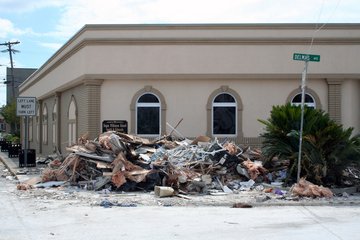With Hurricane Florence still fresh on our minds – and those in the region with the most damage having just begun to recover – it’s a good time to think of how to best prepare for the next storm, flood, or other natural disaster. Part of preparing for a disaster (whether it be flood, fire, earthquake, tornado, or hurricane) includes disaster-proofing your important documents — that is, making sure that after a disaster you have the information and documentation necessary to speed the recovery process. Preparing in this way also means you can focus on personal safety when it counts, and not worry about gathering documents at the last minute.
This article contains tips about what kinds of documents you might need in a disaster, where you should store these important papers, and how technology can help make the job easier.
Part 1: Checklist of Documents to Safeguard
Here is a general list of the kinds documents and records you will want to keep safe.
- birth certificates, Social Security cards, passports, citizenship papers
- military discharge papers (DD Form 214)
- your personal address book
- your pets’ recent prescription and vaccination records
- a list of usernames and passwords for online accounts
- marriage licenses, divorce decrees, child custody papers, adoption papers
- insurance policies
- proof of ownership for real estate, vehicles, and other major purchases
- photo or video records of furnishings and other property
- appraisals of jewelry, collectibles, antiques, artwork, and other valuables
- receipts for home improvements (necessary to reduce your capital gain when you sell the home)
- contracts (employment, lease or rental, business, and so on)
- estate planning documents (wills, trusts, funeral instructions, powers-of-attorney, and so on)
- employment and government benefits documents
- financial records, including recent federal and state tax returns, stock and bond certificates, investment records, brokerage and retirement account information, and a list of credit and bank account numbers
- business records, including recent tax and payroll returns, and a backup of your accounting software
- backups of important computer files
- fingerprints and dental records for each member of the household, if you have them
- photos, letters, and other personal papers, and
- anything else you would not want to lose.
Part 2: Where to Keep Your Important Papers
When disaster-proofing your documents, there are no hard and fast rules about what to keep where — except regarding your will. The goal is to have everything in at least two places in case one is destroyed or inaccessible. Where you store each item will depend partly on when you expect to need it and partly on how hard it would be to replace.
In our next article, we’ll offer ideas for both physical and digital storage.
For more information on organizing your important information and documents, check out Get It Together: Organize Your Records So Your Family Won’t Have To , by Melanie Cullen and Shae Irving (Nolo).
If you need legal assistance in managing an estate, trust or other elder law issue, the Law Office of Scott C. Painter can help. We specialize in elder law issues ranging from nursing home planning, guardianship, wills, trusts, estates, veteran’s benefits, and other related legal matters. A call to us is free, and the best advice is to act now to educate yourself and your options. Waiting to seek legal counsel may limit your options and be costly. Call now for your free consultation 610-378-5140 or visit https://painterelderlawpc.com/ for more information.
